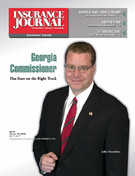Florida is like many other states when it comes to insurance fraud — it recognizes the problem and is doing something about it. Recently, Chief Financial Officer Tom Gallagher and Bob Neumann, director of the Division of Insurance Fraud, spoke to Insurance Journal about the problem and what the Sunshine State is doing about it. The first five responses are from Gallagher and the remaining three are from Neumann.
Insurance Journal: How big a problem is insurance fraud in Florida?
Tom Gallagher: Insurance fraud costs the average Florida family as much as $1,400 a year in higher premiums and higher costs for goods and services. As a result, more employers are finding it increasingly difficult to afford coverage for their workers, even the required workers compensation coverage. And more Floridians than ever are driving uninsured. Insurance fraud is a costly crime, and one that we all pay for.
IJ: What kinds of insurance fraud are most problematic in the state, e.g. workers’ comp, PIP?
Gallagher: All insurance fraud is problematic because of its effect on the cost of premiums. But some kinds of fraud affect people’s health and safety. Unauthorized insurance entities have left thousands of Floridians with unpaid health care bills and in some cases left them unable to get needed medical care or legitimate coverage. Increasingly, PIP fraud schemes involve staged crashes that put participants in danger of being hurt for real. Viatical fraud often robs senior citizens of their savings, leaving them vulnerable to a medical or financial catastrophe. And insurance fraud perpetrators continually find new ways to try to circumvent the law.
IJ: What has Florida done to fight insurance fraud?
Gallagher: In 1979, Florida became the first state to create an insurance fraud division. Initially established by the legislature to address tort fraud, the division today is responsible for investigating fraud in every line of insurance, including health, life, auto, property and workers’ compensation insurance. A reward of up to $25,000 may be offered for information leading to a conviction in complex insurance fraud schemes. The division works with local, state, and federal law enforcement agencies, and this year a prosecutor’s position was created to specifically address PIP fraud. Florida’s fraud hotline is listed in every press release, on billboards and in public service announcements currently being run on television stations throughout the state. For the past several years, Florida has led the nation in the number of insurance fraud arrests and convictions.
IJ: Do we see much fraud within the industry, e.g. agents?
Gallagher: A small number of licensed agents are involved in fraudulent schemes, from pocketing premiums to helping insurance consumers commit fraud by advising them on how to stage an auto accident, ditch a car or lie on an application for a lower premium. Licensed agents also have been involved in selling unauthorized insurance, or helping employers avoid workers’ compensation premiums. Likewise, agents also have been caught taking advantage of consumers, selling them coverage they don’t need or want in order to collect higher commissions.
IJ: Does Florida work with surrounding states to combat the problem?
Gallagher: Representatives from Florida participate on committees and regularly attend meetings of the National Association of Insurance Commissioners and other organizations where intelligence and investigative techniques are shared with other state insurance fraud bureaus.
IJ: Describe how a typical investigation is handled?
Bob Neumann: The division receives tips about possible insurance fraud from many sources, such as other divisions of the Department of Financial Services, an insurance company, another law enforcement agency or a citizen. A lieutenant in the appropriate regional office evaluates the information and, if there is enough information to substantiate an investigation, the case is assigned to an investigator. The investigator conducts interviews and gathers appropriate documentation through subpoenas or search warrants, to determine if a crime has been committed. If probable cause is established, the suspect is arrested either on probable cause or pursuant to an arrest warrant signed by a judge. The case is then scheduled for trial in the appropriate circuit court.
IJ: How many people work in the investigator’s department, and approximately how much money does the state spend on this unit?
Neumann: The Division of Insurance Fraud has approximately 120 sworn law enforcement personnel, including 98 sworn law-enforcement investigators. The division’s budget totals approximately $13 million.
IJ: Do investigators feel they have the upper hand on fraud in the state?
Neumann: PIP fraud alone now represents more than half of the cases being investigated in our Miami office. Insurance fraud referrals to the Division of Insurance Fraud have held steady or increased every year. To address the largest and most costly crimes, the division in the past year implemented a rating system that ranks cased based on the number of potential victims, amount of money stolen and the vulnerability of the victims — whether they are senior citizens, disabled or in some other way particular vulnerable to being targeted by fraud schemes.
To comment on this story, e-mail dthomas@insurancejournal.com.
Topics Agencies Florida Fraud Workers' Compensation A.J. Gallagher
Was this article valuable?
Here are more articles you may enjoy.


 Charges Dropped Against ‘Poster Boy’ Florida Contractor Accused of Insurance Fraud
Charges Dropped Against ‘Poster Boy’ Florida Contractor Accused of Insurance Fraud  Howden-Driven Talent War Has Cost Brown & Brown $23M in Revenue, CEO Says
Howden-Driven Talent War Has Cost Brown & Brown $23M in Revenue, CEO Says  Former Ole Miss Standout Player Convicted in $194M Medicare, CHAMPVA Fraud
Former Ole Miss Standout Player Convicted in $194M Medicare, CHAMPVA Fraud  GEICO Settles Call-Center Worker Suits for $940,000; Attorneys Get Half
GEICO Settles Call-Center Worker Suits for $940,000; Attorneys Get Half 


